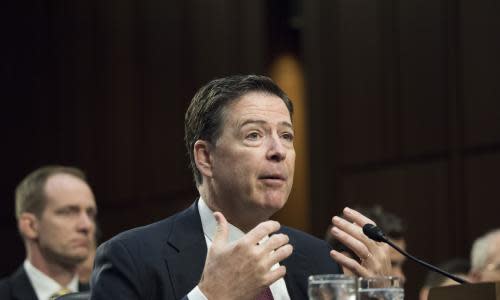Either Trump or Comey is lying. Who might it be? | Lawrence Douglas

To believe the president’s statement, we must conclude not only that Comey perjured himself but that he is a liar of exceptional premeditation
Hope. Bill Clinton hailed from it. Barack Obama ran on it. And now Donald Trump is choking on it. “I hope you can see your way clear to letting this go, to letting Flynn go. He is a good guy. I hope you can let this go.” These three sentences may spell Trump’s doom.
And that is why Thursday’s astonishing events offered three very different constructions of these suddenly all important words. The first came from former FBI director James Comey in his sworn testimony before the Senate intelligence committee.
Comey heard these words, allegedly uttered by the president during a private meeting in the White House on Valentine’s Day, as a thinly veiled directive. Astonished and deeply disturbed, he carefully memorialized the president’s words in a contemporaneous memo, discussed them with equally astonished senior officials in the intelligence and law enforcement community, and tried to shield his underlings from them – lest they exercise a chilling effect on the ongoing investigation of possible criminal wrongdoing on the part of the recently departed national security adviser, Michael Flynn.
The second construction came courtesy of James Risch, a Republican senator from Idaho, who, in the committee hearing, sought to place a benign stamp on the president’s expressions of “hope”. To Risch, the president sounded less like a mob leader snarling to a henchman: “I hope this problem will go away” and more like a friend saying: “I hope tomorrow will be a sunny day.”
The senator asked Comey: “Do you know of any case where a person has been charged for obstruction of justice or, for that matter, any other criminal offense, where … they said, or thought, they hoped for an outcome?” – the clear suggestion being, of course not.
If Risch, and the other Republicans on the committee, were offering the president a way to massage his way out of a perilous situation, Trump aggressively declined the offer. And so we have the president’s construction of the meeting as expressed in a statement prepared by Marc Kasowitz, his personal attorney, and released just after the conclusion of Comey’s testimony.
This statement claims that the president “never told Mr Comey, ‘I need loyalty, I expect loyalty’ in form or substance”. It further insists: “The president never, in form or substance, directed or suggested that Mr Comey stop investigating anyone, including suggesting that that Mr Comey ‘let Flynn go.’”
In emphatically contradicting Comey’s sworn testimony, the president has placed front and center the question that Risch tactically sidestepped. Who is lying – Trump or Comey? What is clear is that the members of the Senate intelligence committee appear unanimous in their agreement that it must be Trump.
Not one senator hazarded as much as a single question challenging Comey’s veracity – not James Lankford, not Tom Cotton, not John Cornyn, three of the Senate’s most reliably conservative members. In a fractious political universe that has worked to destabilize appeals to any shared truths, a bipartisan group of senators made clear their belief that the president was lying.
The conclusion follows not simply from Trump’s long and durable history of mendacity. To believe the president’s statement, we must conclude not only that Comey perjured himself on Thursday but that the former director is a liar of exceptional premeditation and forethought. We must conclude that Comey dashed out of a meeting with the president to fabricate a false contemporaneous account of that meeting which he then maliciously shared with other senior officials.
We must additionally believe that Comey is not simply a liar but also a traitor, who has been conspiring to bring down the recently elected president of the United States. Bizarre as this sounds, it is precisely what the president’s statement claims.
Gesturing to those “who are actively attempting to undermine this administration with selective and illegal leaks of classified information and privileged communications”, the statement indicts Comey “as one of these leakers”. The former director of the FBI has lied and leaked to destroy the president. Only missing are the references to the “deep state”.
And yet for president’s account to work, it must shoulder a final burden of explanation. Why, if by his own lights he met with Comey simply to say “General Flynn is a good guy, he has been through a lot” and to ask “How is General Flynn is doing?” – why the privacy? Why shoo away the attorney general, the chief of staff and a senior adviser? A most unusual setting for uttering anodyne words of solicitude.
But the very fact that the president and his lawyer have declined to follow Risch’s lead and instead have chosen the path of outright denial may reveal something more than Trump’s penchant for pugnacity.
Risch rhetorically suggested that no one has ever been convicted of obstruction of justice for expressing “hope”. In this he was wrong. The eighth circuit court of appeals has upheld a conviction in precisely such a case. Perhaps Kasowitz conducted a more systematic search of case law than did the senator.
